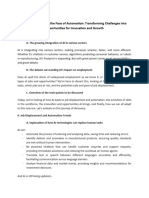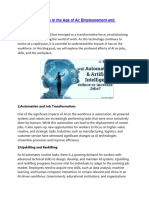0% found this document useful (0 votes)
5 views2 pagesFuture of Work AI
The document discusses how artificial intelligence is reshaping the workplace by automating tasks, creating new career paths, and necessitating continuous upskilling. It highlights both the opportunities and challenges posed by AI, including job displacement and the need for ethical considerations. Ultimately, it emphasizes the importance of adaptability and lifelong learning for success in an AI-driven future.
Uploaded by
fishsalmonyuxiaoguiCopyright
© © All Rights Reserved
We take content rights seriously. If you suspect this is your content, claim it here.
Available Formats
Download as DOCX, PDF, TXT or read online on Scribd
0% found this document useful (0 votes)
5 views2 pagesFuture of Work AI
The document discusses how artificial intelligence is reshaping the workplace by automating tasks, creating new career paths, and necessitating continuous upskilling. It highlights both the opportunities and challenges posed by AI, including job displacement and the need for ethical considerations. Ultimately, it emphasizes the importance of adaptability and lifelong learning for success in an AI-driven future.
Uploaded by
fishsalmonyuxiaoguiCopyright
© © All Rights Reserved
We take content rights seriously. If you suspect this is your content, claim it here.
Available Formats
Download as DOCX, PDF, TXT or read online on Scribd
/ 2
























































